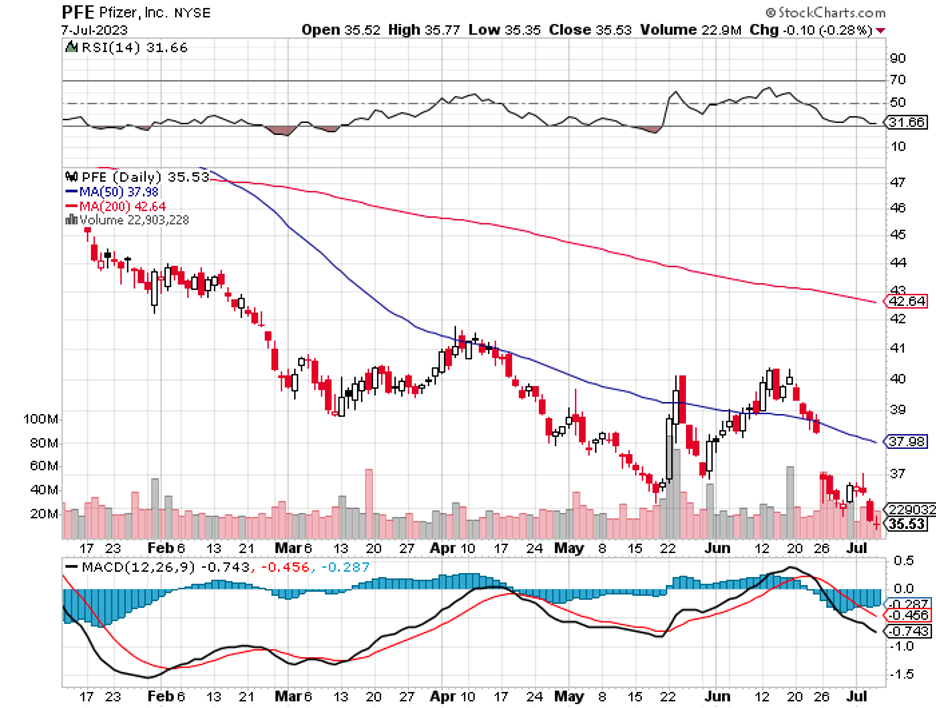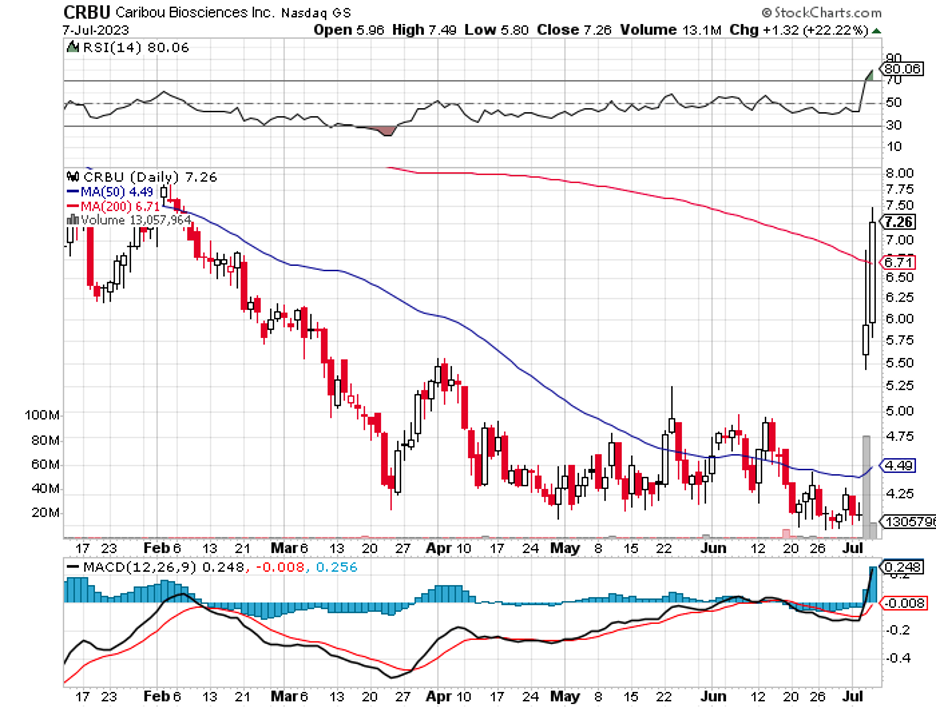A Calculated Gamble
There has been a lot of chin-wagging about whether we're on a collision course with a recession or on the upswing. I get it. It's as confusing as figuring out why Warren Buffet didn't invest in Apple (AAPL) sooner.
Still, there are stocks that, recession or not, will let you sleep like a baby. In the biotechnology and healthcare sector, Pfizer (PFE) stands out as one of those stocks. In bear markets, it fares well because, well, let's face it, health trumps wealth every time.
Now, you might look at Pfizer's recent earnings and think it's taken a bit of a tumble. No growth in revenue or EPS in the first quarter of 2023? That’s definitely worrisome. But hold your horses. Let's peel back the layers a bit to see the full picture.
Pfizer has been raking in the dough from its COVID-19 potions, especially its vaccine Comirnaty and therapy Paxlovid. With the COVID gold rush subsiding, the company reported a 29% dip in revenue in Q1, clocking in at $18.3 billion.
Remember, context is key. Strip out the COVID-19 products, and revenue has actually nudged up 5% YoY.
It’s the same story with the company's forecast.
Revenues are predicted to be between $67 billion and $71 billion, a drop of 29% to 33%. But subtract the COVID dollars and cents, and Pfizer's set to grow between 7% to 9%.
What's Pfizer doing with its COVID-19 windfall? It's not buying beachfront properties, that's for sure.
Instead, it has a staggering 101 programs in the pipeline, including 38 in phase 3 trials. This year, the company also had four new approvals, from new uses for Paxlovid and Prevnar 20 to a vaccine for older folks and a nasal spray for migraines.
But the market's jittery about the predicted revenue drop, causing the stock to tumble 21% this year. That just makes it a bargain.
Pfizer's trading at less than 8 times earnings makes it the frugal shopper's dream.
To sweeten the pot, Pfizer's upped its quarterly dividend by 2.5% to $0.41 a pop. That gives a yield of about 4%, twice the average of the S&P 500. More impressively, it's been doing this for 14 consecutive years.
However, Pfizer's not resting on its laurels.
Its latest move? A 7% stake in Caribou Biosciences (CRBU), a firm that's pushing the boundaries of gene-editing tech and cell therapies for cancer. It's like investing in a tech startup but with a biological twist.
Caribou's stock has taken a wild ride since it went public in 2021, peaking at over $30 and dipping to a recent low of $4. After Pfizer's buy-in, it jumped 46% to $5.94. A small stake of $25 million, but it's a clear sign that gene editing is back in the spotlight.
Moreover, Caribou's no one-trick pony.
It's testing treatments based on the Nobel Prize-winning CRISPR technology. This precision tool allows doctors to zero in on problematic DNA and tweak it. The potential for treatments for cancer and genetic disorders is mind-boggling.
Caribou currently has a pair of potential game-changers simmering in the preliminary stages.
First up is their experimental treatment, CB-010, aiming a direct hit at blood cancer lymphoma. This therapy manipulates immune cells to lock onto the cancer.
Picture them as bounty hunters of the body, genetically tweaked to bring down the cancerous bad guys.
To date, we've got a trio of these CAR-T therapies courtesy of other pharmaceutical giants in the game, but they all work on modifying the patient's immune cells. Unfortunately, not every patient’s cells are ripe for the CAR-T transformation.
This is where Caribou switches things up.
The biotech’s CAR-T therapy is akin to a supermarket for immune cells – off-the-shelf and ready for action. Through some nifty gene editing, immune cells from healthy volunteers are modified and packed for delivery.
In theory, these should pack more punch. And it seems they do, judging by Caribou's initial guinea pigs – six lymphoma patients who saw their cancer vanish without a trace after a rendezvous with Caribou's CAR-T.
Obviously, they’re not promising an everlasting disappearance, but a couple of these folks kept their cancer at bay for at least a year.
While Caribou isn't alone in the off-the-shelf CAR-T quest, they've put up a stellar performance so far against the likes of Intellia Therapeutics (NTLA) and CRISPR Therapeutics (CRSP).
Caribou’s pipeline also features another off-the-shelf CAR-T contender battling the blood disorder known as multiple myeloma. This therapy, dubbed CB-011, is what specifically caught Pfizer's eye. Basically, Pfizer’s investment has earned it the right to haggle for a license if another suitor comes courting for Caribou's star player.
But Caribou's act doesn't end here.
It has a growing ensemble featuring CB-012, a CAR-T cell therapy focused on recurrent or stubborn acute myeloid leukemia, and CB-020, another CAR-T variant for various stubborn tumors.
Pre-Pfizer deal, Caribou boasted a cash reservoir of $291 million, promising smooth sailing until around 2025.
Caribou promises an action-packed second half of 2023, with an update on CB-010's phase 1 trial safety and efficacy, a dose-escalation report for CB-011's phase 1 trial, and a new drug application for CB-012 targeting relapsed/refractory acute myeloid myeloma.
As with all biotechs in the clinical stage, though, it's a bit of a gamble. With some key milestones expected later this year, investors are watching with bated breath to see if the company can deliver.
If the dice roll the right way, Caribou could be a jackpot for Pfizer – and for savvy investors.
So if you're looking for a stock that has the potential to thrive despite market uncertainties, with a dash of excitement and a sprinkle of future possibilities, Pfizer could be your ticket.
Not only is it a reliable dividend payer, but its recent ventures show it's also not afraid to swing for the fences.


